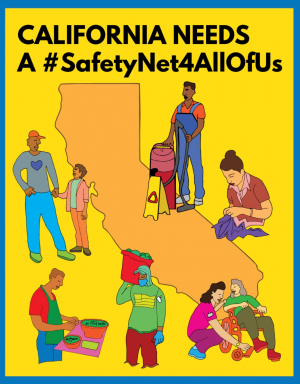The Golden State Stimulus deal announced today by Governor Newsom with legislative leadership is a strong first step in providing financial relief for many undocumented immigrants in California, and centering economic relief from the pandemic on need, not immigration status. In the package announced today, ITIN holders earning up to $75,000 will receive $600 in relief, with those who qualify for the California Earned Income Tax Credit receive a total $1,200 payment - critical aid to undocumented immigrants left out of federal relief efforts. Additionally, it grants a $600 payment to households enrolled in the CalWORKS program, and $600 for recipients of SSI/SSP and Cash Assistance Program for Immigrants (CAPI).
The initial progress achieved today could not have been reached without the tireless organizing, testimony, and advocacy of undocumented workers across California, whose courage made this possible. We are proud to stand with the undocumented workers who have organized for relief over the past year, and know the achievements made today are only the first step in realizing a more equitable future.
The Safety Net For All coalition applauded the important initial steps this package takes for working families, including undocumented Californians file their taxes using an Individual Tax Identification Number (ITIN). Undocumented workers are integral members of our vibrant local communities who deeply enrich our state, and are critically in need of state relief after being shut out of all federal relief packages despite the disproportionate impact this pandemic has had on them. We look forward to increasing access to relief for more California families.
The requirement of being an ITIN holder in order to receive relief through this package has caused concern amongst immigration advocates, who warn that requiring ITINs could still be a significant barrier for the many undocumented workers in California without them. As we look ahead to the rest of the legislative session and annual budget process, it will be imperative for the Governor and legislature to take action to expand access to ITINs, provide additional payments to these families, expand coverage to more excluded workers, and take concrete action towards a long term solution for this gaping hole in our safety net. Undocumented workers represent one in ten workers in California, yet are not eligible for Unemployment Insurance when they lose their job through no fault of their own.
The Safety Net For All coalition has been a leading voice on economic justice for undocumented California families and workers throughout the pandemic since first organizing last spring following the Shelter in Place order. The coalition consists of a diverse partnership of 140 powerful organizations spanning all regions of California, including immigrant advocacy organizations, labor unions, worker centers, policy advocacy organizations, legal services groups, direct service providers, and more. The coalition’s demands for emergency and long-term financial relief for undocumented workers have been supported by over 125 local elected officials, hundreds of academics, as well as major charitable foundations.
The coalition applauds Governor Newsom, Senate Pres pro-Tem Atkins, Assembly Speaker Rendon, Senate Budget Chair Skinner, Assembly Budget Chair Ting, Senator Anna Caballero, and Assemblymember Wendy Carrillo and for including undocumented workers with ITINs in the relief efforts. We also applaud California Assemblymember Ash Kalra (D-San Jose) and the sixteen additional members of the legislature who just days ago urged expanded protections for undocumented immigrants in this package. California has more than 2 million undocumented immigrants, who are integral to the fabric of our society and health of our local communities.

